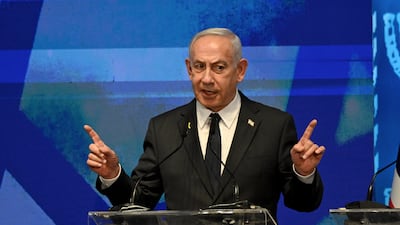Israeli Prime Minister Benjamin Netanyahu’s announcement that he plans to run for office again next year has prompted protesters to take to the streets in Jerusalem and Tel Aviv. They’re right to do so. That’s because Mr Netanyahu’s leadership has undermined the long-term viability of his country. His actions in Gaza and open encouragement of illegal land grabs have led to international isolation, strained relationships with key allies in the Arab world and the West and engulfed Gazans in a humanitarian crisis.
Beyond the fact that the horrific events of October 7 took place on his watch, the Prime Minister’s collective punishment of Gaza has ignited unprecedented pushback from the international community. Accusations of apartheid and war crimes have eroded Israel’s legitimacy as a state, threatened the country’s relationship with the West and prompted several European partners to recognise a Palestinian state in protest. Mr Netanyahu’s policies in Gaza have even managed to breach the country’s longtime hold on the American right, with much of the Maga movement now questioning why the US continues to champion Israel as it seeds its coffers with billions of taxpayer dollars.
As Israel’s longest-serving prime minister (he has held that role for 18 out of the past 29 years), Mr Netanyahu’s track record is one of political expediency, whether flip-flopping on a two-state solution, undermining the judiciary or attempting to limit democratic institutions, his primary concern seems to be maintaining power and avoiding prosecution rather than advancing the cause of peace and the long-term prosperity of Israel.
None of this adds up to a better outlook for the Israeli state or its people. For context, Israeli elections are won on the basis of national security. People may grumble about the economy, the lack of affordable housing and societal issues generally, but at the voting booth the deciding factor is usually “can this candidate keep us safe”. It should be abundantly clear by now that when it comes to Mr Netanyahu the answer to that question is no.
And despite US President Donald Trump’s enormous success in getting both sides to a ceasefire, the question remains: is Israel committed to a true and lasting peace with its neighbours or will the country continue on the offensive, sowing chaos in the region in order to justify violence and territorial gains? At the recent Munich Leaders Forum in AlUla, Saudi Arabia, the position of many Arab foreign ministers was clear: if Mr Netanyahu fails to keep his word on a ceasefire or commitment to ultimately end the war, Israel will find a much more hostile neighbourhood going forward.
Mr Netanyahu’s strategy provides a sharp contrast with the more long-term thinking espoused by countries like the UAE, who have chosen not to renege on the Abraham Accords despite condemnation of Israel’s war in Gaza and a lack of trust in Israel’s current leadership. In this, we see Arab states demonstrating a deeper commitment to the security of the region. They are putting their people first when it comes to security and economic prosperity, recognising rightly that peace is just better for business.
Meanwhile, Saudi Arabia’s recent defence pact with Pakistan, a nuclear power, sets a new precedent for strategic deterrence and frees up the kingdom from sole reliance on the US for external defence. It’s a move that could be replicated by other Arab states, simply because they no longer believe American security guarantees are enough. And for Israel, a world where Arab states rely less on America for security, prosperity and direction adds up to a Middle East that is less likely to allow them carte blanche in future.


